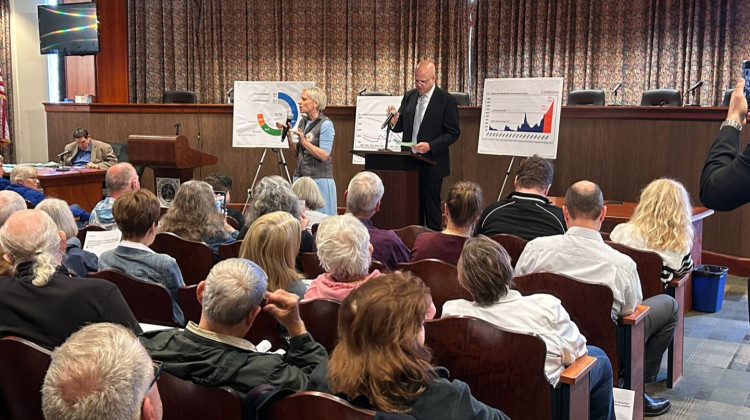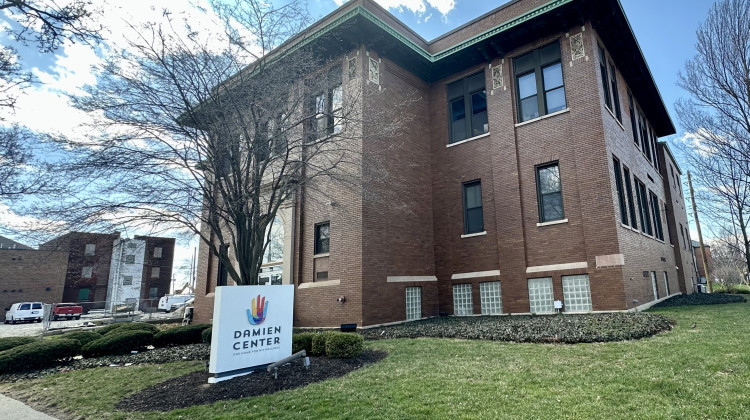
Faith In Indiana started the Black Youth Collective in 2022. Georon Evans, 20, far right, and Londen, 15, second from left, stand with their other fellows at the Indiana Interchurch Center in July.
Faith In IndianaA local faith group is helping Black Indianapolis youth learn about politics and empowerment. The eight young people in the first cohort of Faith in Indiana’s Black Youth Collective fellowship program are using the experience to advocate for more mental health awareness in the city.
Georon Evans, 20, said the program gives him a voice and a position beyond the negative stereotypes of Black men that others project on him.
“It gives me a power — a power to organize,” Evans said. “And it puts me in a space where I can get young folk also like myself to want and see change in the community.”
Evans lost five friends to gun violence over the past four years. That’s a reason why he decided to apply for the paid-fellowship that serves 15- to 20-year-olds.
“This numb feeling that you get from something like that, it makes you really like — you almost expect it,” Evans said. “You expect one day your life will be taken.”
In 2021 there were 271 homicides and 324 victims of non-fatal shootings in Indianapolis. The number of homicides so far in 2022 is fewer compared to this time last year, according to Indianapolis Metropolitan Police Department. Yet, the ongoing violence creates fear and depression among the city's youth, and even Evans himself.
"So what's, like, the real point of living, you know?," Evans said about how he's felt in the past. "What do I get out of it when I know I'm just gonna get my life taken away from me at any cause.”
But now Evans has shifted his mindset and wants to make a difference in his community.
“My long term goal for this is just to change the narrative within the city of youth in general,” Evans said. “You know, how we’re criminalized as thugs, welfare queens, or just people that are lazy good for nothings, when I know that's just not true.”
Advocates for mental health
The Black Youth Collective is advocating for more mental health awareness, especially for low-income community members who can’t afford those services, said 15-year-old Londen, another fellow.
“A lot of people have mental health problems and a lot of people don't have anybody to lean on,” Londen said.
A goal of the collective is to expand the city’s emergency dispatch system to create a new clinician and mental crisis response team. They also want to offer more options on the dispatch line so people who are having a mental health crisis don’t have to call the police.
Some advocates believe a 24-hour emergency mental health dispatch system could have helped prevent the death of Herman Whitfield III, who died during police custody in April.
Indianapolis leaders are taking note. Monday night Mayor Joe Hogsett released his proposed 2023 budget with $2 million ear-marked for a 24-hour clinician-led emergency response team.
Other cities have already created similar programs. In Eugene, Ore., the Crisis Assistance Helping Out On The Streets, or CAHOOTS, program through the city's local White Bird Clinic has served as an emergency mental health dispatch system for more than 30 years.
Evans said the collective is working with Hogsett's office to figure out what an updated dispatch system could look like in Indianapolis.
“Suicide is a part of mental health, but it's not the only part of mental health,” Evans said. “It varies from what you see in everyday streets, what you [are] going through in school, at home because it's such a big problem. But there's so many key issues involved with it.”
The fellows in the collective also want the city to mandate more data transparency policies for police.
Josh Riddick, an organizer for Faith in Indiana’s Black Church Coalition, said the goal of the fellowship program is to build power for teens and young adults in Marion County.
“In so many spaces, our Black youth are used as statistics, as narrative plot points, as these kind of flattened characters who are also victims and perpetrators of all sorts of injustice and violence, Riddick said. “And we recognize that's not the full narrative and the full breadth of our Black youth.”
This generation of young people have navigated the COVID-19 pandemic, social justice protests, climate change and much more. Riddick said the community must equip youth with the resources they need to tackle these problems.
“Every social movement in this country was led by young people,” Riddick said. “And if we're going to be serious about the type of change we want to build within the Black church coalition, we had to build a vehicle for our young people to participate and build power."
Contact WFYI education reporter Elizabeth Gabriel at egabriel@wfyi.org. Follow on Twitter: @_elizabethgabs.
 DONATE
DONATE






 Support WFYI. We can't do it without you.
Support WFYI. We can't do it without you.